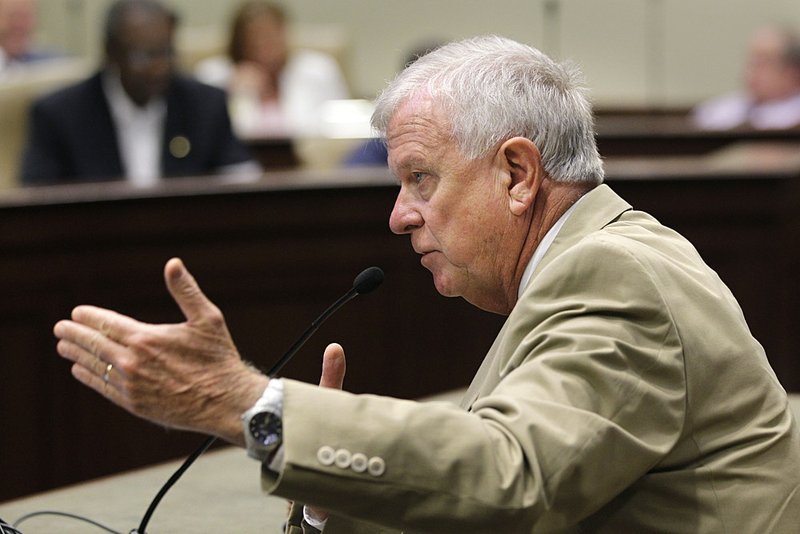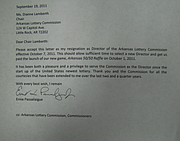LITTLE ROCK — Ernie Passailaigue wrote that his resignation as Arkansas lottery director is effective Oct. 7, partly to “allow sufficient time to select a new director,” but the Lottery Commission chairman and several other commissioners said Tuesday that they intend to take the time needed to hire the best candidate and don’t expect to have one hired by Oct. 7.
“We will not have an abbreviated search,” Chairman Dianne Lamberth said a day after the commission accepted the resignation of the man who has led the lottery’s development since he was hired in June 2009. Lottery spokesman Julie Baldridge was appointed interim director.
Lamberth also said she favors paying Passailaigue’s successor an annual salary that’s lower than Passailaigue’s $326,832, but she declined to be more specific.
“We felt the salary that we have given Ernie was appropriate for the startup and the time involved and knowledge,” Lamberth said. “I have always said that once we were up and running the salary would be decreased for the next director.”
She said she hasn’t talked with the other eight commissioners about that yet. But several said Tuesday that they also support paying the next director a lower salary.
Sen. Johnny Key, RMountain Home, said he’s “quite certain” that the Legislature’s lottery oversight committee, of which he is co-chairman, won’t approve a salary for the lottery’s next director that “will be anywhere near the $324,000approved last time.
“Where it ends up depends on the selection and the quality and that experience that person will bring to the table,” he said.
Passailaigue’s base salary is $141,603, and a special salary allowance permitted under the state’s lottery law enabled the commission to hire him at $324,000 with the approval of the oversight committee.
Lamberthsaid she prefers that the commission search in the state and out of the state for a permanent director.
“My personal opinion is we don’t close any doors to anyone who is qualified for the position,” she said.
She said she hopes that the commission will able to meet next week to determine the qualifications for the director and approve the process for the search based on recommendations from its personnel committee.
“I hope we move quickly,” said Commissioner Mike Malone of Fayetteville. “I don’t know if that is a matter of weeks or a couple of months.”
Commissioner Bruce Engstrom of North Little Rock added, “I guarantee if Superman walked in tomorrow, we would probably go ahead and take him.”
Malone said he favors a broad in-state search because there are “talented financial professionals and business leaders all over the state,” but he has no candidates in mind.
“I am not convinced we need to do a national search,” Malone said. “We certainly need lottery experience on our management team.”
Commissioner Steve Faris of Central said the commission needs to search diligently inside Arkansas, and “if we can’t find anybody in the state to meet the needs, we need to look nationally.
“I think everyone I have talked to is of the opinion that the salary needs to be lower,” he said.
He said the commission also needs to review how other state lotteries pay their directors and “keep all of our options open.”
Commissioner John C. “Smokey” Campbell of Hot Springs said it would be nice to hire a qualified person from Arkansas, but if “he’s not, he’s not.”
House Chief of Staff Bill Stovall, a former House speaker, has said he would be interested in the job after talking about it with House Speaker Robert S. Moore Jr., if the commission is interested in his candidacy.
Other names have surfaced. Asked whether he had any interest in the position, Department of Higher Education Interim Director Shane Broadway, a former state senator and House speaker, said he has “always said that I am here to serve the state.
“If someone determines a need for that service I am willing to do so, if I can make a difference and if I can balance my service with the needs of my family at this time,” he said.
But state law prohibits a former member of the General Assembly from being employed by any state agency within 24 months of leaving office in any job that was created by legislative action within the 24 months before the member left office. The lottery director’s job was created by the 2009 General Assembly. Broadway departed the state Senate in December 2010.
Key said it’s “way premature” to talk about specific names for the job.
“I think they need to give opportunities to people outside of state government and maybe to someone without lottery experience,” he said. “We just want to make sure they get it right for the long-term.Rushing into it with names is way premature.”
Campbell said he nominated Baldridge to be the interim director because “I just thought she would do a bang-up job for us.”
Baldridge “knows most of the politicians and the agencies and how they work,” he said. “She will be a benefit to us, however long it takes” to fill the permanent director’s job.
Baldridge, who has been the public relations, legislative and commission liaison director, will be paid $107,100 as interim director, the same salary as before, according to Lamberth.
Among other things, Baldridge has been an aide to former Senate President Pro Tempore Bob Johnson of Bigelow, managed former U.S. Rep. Ray Thornton’s congressional office (Thornton later was chairman of the commission), and worked for Bill Clinton when Clinton was governor of Arkansas.
Commissioner Raymond Frazier of Little Rock said the commissioners talked “about all the upper echelon employees” at the lottery as possible interim directors but chose Baldridge because she’s competent, intends to retire in 15 months and won’t seek the permanent job.
One of the lottery’s two vice presidents, David Barden, was one of four finalists for the Arkansas director’s job in 2009 before the commission hired Passailaigue. In January, Barden was one of four finalists for the executive director’s job for the North Carolina lottery, which promoted its interim director into the job, instead.
The lottery’s other vice president is Ernestine Middleton. Barden and Middleton worked for Passailaigue at the South Carolina lottery and were hired by Passailaigue at starting annual salaries of $225,000 to work for Arkansas’ lottery.
The director is in charge of personnel for the lottery and is one of two employees who report directly to the commission.
Asked whether Barden and Middleton will be retained, Baldridge replied, “I don’t have any plans about personnel. I haven’t been briefed by the commission on what they expect. A lot has to do with what they have planned.”
Malone added, “We need to be sure the lottery expertise remains in the organization. We certainly need the lottery expertise whether it is David or otherwise. We need to make sure we have folks who have run and operated lotteries before. That’s a pretty critical part of the management team.”
Barden, Middleton and Passailaigue could not be reached for comment Tuesday at the lottery’s headquarters in Little Rock.
Key said he would like for the commission and whomever it hires as Passailaigue’s successor to evaluate the structure of the lottery and recommend changes if needed for the Legislature to consider.
“Now we actually have a track record, it’s time to look at it again to see if we got it right and if we didn’t to correct it,” Key said.
Front Section, Pages 1 on 09/21/2011


